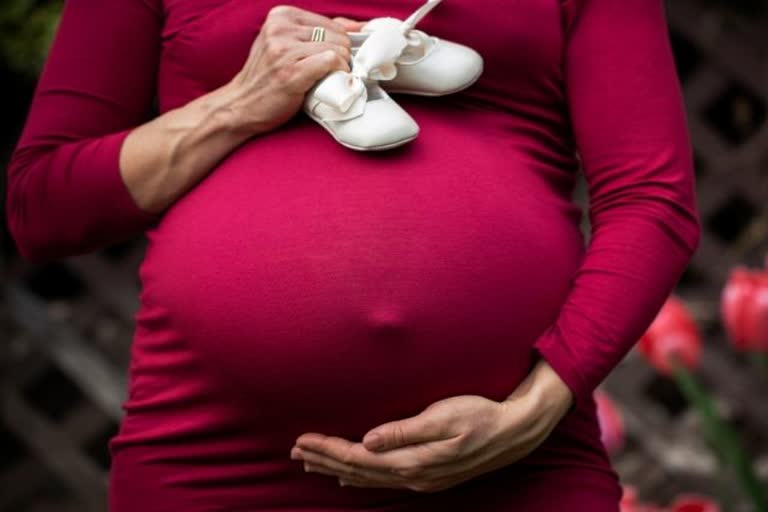"Pregnant women with certain high-risk conditions such as hypertension, diabetes, chronic respiratory conditions, asthma, cystic fibrosis, homozygous sickle cell disease, or those on immune suppression therapies, dialysis or advanced chronic kidney disease, congenital or acquired heart disease and organ transplant recipients have a greater risk of severe illness from COVID-19," says Dr. Sumitra Bachani, Associate Professor, Gynaecologist and Obstetrician Department, Safdarjung Hospital and Vardhaman Mahavir Medical College.

She said that pregnant women with symptomatic COVID are at an increased risk of adverse pregnancy outcomes, including admission to the ICU, iatrogenic pre-term birth, pregnancy-associated hypertension-like symptoms, operative intervention and even death.
Also, there is a higher risk of developing COVID complications if a pregnant woman contracts the infection in the third trimester which is the last three months of pregnancy. That is because the large uterus presses on the diaphragm and hampers the lung capacity thus making it more difficult for the woman to maintain oxygen saturation, she said.
As stated in “Coronavirus (COVID-19) infection in pregnancy – guidance for healthcare professionals” published by the Royal College of Obstetricians and Gynaecologists (RCOG), Royal College of Midwives and Royal College of Paediatrics and Child Health, with input from the Royal College of Anaesthetists, the Obstetric Anaesthetists’ Association, Public Health England and Public Health Scotland, Pregnant women appear no more or less likely to contract SARS-CoV-2 than the general population, and more than two-thirds of identified pregnant women have no symptoms. The most common symptoms of COVID-19 in pregnant women are cough and fever. There is growing evidence that pregnant women may be at increased risk of severe illness from COVID-19 compared with non-pregnant women, particularly in the third trimester. The overall risk of death remains very low.
Risk factors associated both with being infected and hospitalised with COVID-19 include ethnic minority backgrounds, having a BMI above 25 kg/m2, having a pre-pregnancy co-morbidity, (e.g. diabetes or hypertension), a maternal age of 35 years or older, living in increased socioeconomic deprivation and working in healthcare or other public-facing occupations. The delta variant seems to be associated with more severe disease: 1:10 symptomatic women admitted to hospital with alpha variant needed admission to intensive care whereas this is 1:7 for symptomatic women with the delta variant.
There is no reported increase in congenital anomalies incidence because of COVID-19 infection. Vertical transmission is rare. Maternal COVID-19 infection is associated with an approximately doubled risk of stillbirth and may be associated with an increased incidence of small-for-gestational-age babies. The preterm birth rate in women with symptomatic COVID-19 appears to be two to three times higher than the background rate; these are primarily iatrogenic preterm births.
On the question of infection transmission from mother to the foetus, she said that such transmission to the foetus during pregnancy is yet a matter under research. To date, we have observed that mild to moderate COVID-19 infection in mothers does not affect the foetus or the newborn much. However, in severe cases, the foetus is at risk of perinatal morbidity due to hypoxia or low oxygen saturation, pre-term birth, and mortality.
However, mother and infant can stay together in the same room if the mother does not have severe COVID-19 which requires hospitalisation. Make sure that the room is well-ventilated and there is someone else also in the family who is COVID negative to take care of the infant. A mother should wear a mask and maintain 6 feet distance from the child. However, she can breastfeed the child, adds Bachani.
Asked about COVID vaccine for pregnant women and young mothers, Bachani added that they should definitely take the vaccine. Experts say the benefits of vaccination outweigh the risk of morbidity and mortality associated with COVID-19, especially if contracted during pregnancy. Besides, there is an additional benefit -- a vaccinated mother also passes the antibodies she develops post-vaccination to the unborn foetus through blood as well as through breast milk.
However, she added that like the general population, pregnant women too should avoid taking vaccine if she has an anaphylactic or allergic reaction to the previous dose of COVID-19 vaccine or to other vaccines or injectable therapies, pharmaceutical products, food items, etc.
"If she has recently been diagnosed with COVID-19 infection, she should wait for 12 weeks from the onset of infection or 4 to 8 weeks from recovery from active COVID-19 infection for taking the vaccine" added Bachani.
(IANS & RCOG)
Also read: Pregnant Women With COVID-19 Face Higher Risk Of Pre-Eclampsia: Study



